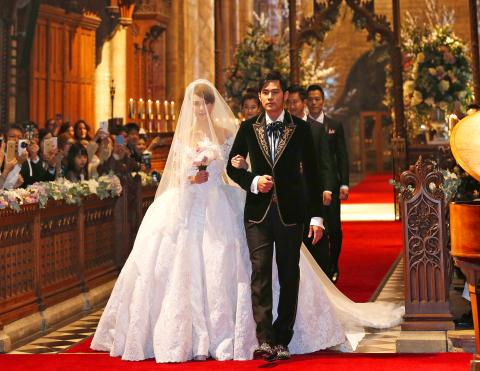Mando-pop king Jay Chou (周杰倫) and Taiwanese-Australian model/actress Hannah Quinlivan (昆凌) were married in Yorkshire, England, on Saturday afternoon in an extravagant ceremony featuring a string ensemble playing a composition by Chou.
The ceremony at Selby Abbey, in the town of Selby, came the day before Chou’s 36th birthday.
Quinlivan, 21, wore a heavily embroidered ball gown and a NT$33.38 million (US$1.05 million) tiara and necklace worth NT$278.1 million by French jeweler Chaumet.

Photo: Courtesy of JVR Music
Chou said he wrote a song for his marriage “to make the wedding different.”
The Chinese-language Apple Daily yesterday said the ceremony was believed to have cost more than NT$20 million, including accommodation for guests, which it said cost about NT$10 million.
Chou did not accept any sponsorship for the wedding.

Photo: CNA
However, it was not clear yesterday whether the Selby Abbey ceremony was actually a wedding or a “blessing” service.
According to the abbey’s Web site, under UK law, to be married in the abbey would require at least one of the couple to have lived in the parish of Selby Abbey, attended services for a set period there, or had a parent or grandparent married at the abbey.
According to JVR Music, the couple registered their marriage last year. It is unclear whether the marriage was registered in Taiwan or another country.
Chou’s record and management company, JVR Music, on Saturday released three engagement photographs of the couple that were taken in France, Germany and the Czech Republic in October last year.
One of the photos shows the couple facing each other with the Prague’s historic Charles Bridge the background.
Another shows Quinlivan in a long white dress embracing Chou, who is wearing a white shirt and dark vest and pants, next to a horse in a pasture, with the iconic Bavarian castle of Neuschwanstein in the background.
This story has been amended since it was first published to correct the date of the wedding.

Taiwan is stepping up plans to create self-sufficient supply chains for combat drones and increase foreign orders from the US to counter China’s numerical superiority, a defense official said on Saturday. Commenting on condition of anonymity, the official said the nation’s armed forces are in agreement with US Admiral Samuel Paparo’s assessment that Taiwan’s military must be prepared to turn the nation’s waters into a “hellscape” for the Chinese People’s Liberation Army (PLA). Paparo, the commander of the US Indo-Pacific Command, reiterated the concept during a Congressional hearing in Washington on Wednesday. He first coined the term in a security conference last

Prosecutors today declined to say who was questioned regarding alleged forgery on petitions to recall Democratic Progressive Party (DPP) legislators, after Chinese-language media earlier reported that members of the Chinese Nationalist Party (KMT) Youth League were brought in for questioning. The Ministry of Justice Investigation Bureau confirmed that two people had been questioned, but did not disclose any further information about the ongoing investigation. KMT Youth League members Lee Hsiao-liang (李孝亮) and Liu Szu-yin (劉思吟) — who are leading the effort to recall DPP caucus chief executive Rosalia Wu (吳思瑤) and Legislator Wu Pei-yi (吳沛憶) — both posted on Facebook saying: “I

Sung Chien-liang (宋建樑), who led efforts to recall Democratic Progressive Party (DPP) Legislator Lee Kun-cheng (李坤城), was released on bail of NT$80,000 today amid outcry over his decision to wear a Nazi armband to questioning the night before. Sung arrived at the New Taipei District Prosecutors’ Office for questioning in a recall petition forgery case last night wearing a red armband bearing a swastika, carrying a copy of Adolf Hitler’s Mein Kampf and giving a Nazi salute. Sung left the building at 1:15am without the armband and covering the book with his coat. Lee said today that this is a serious

Firefighters are working to put out a fire on Taipei’s Yangmingshan (陽明山) reported earlier this morning. The cause of the fire is still under investigation. The Taipei Fire Department said it received a report of a fire at Xiaoyoukeng (小油坑) at 11:17am, dispatching four command vehicles, 16 firetrucks, one ambulance and 72 personnel. The fire is still burning on about 250m² of land, according to initial estimates, as eyewitnesses reported seeing smoke rising from the mountain. The Yangmingshan National Park Headquarters on Facebook said the Qixingshan (七星山) hiking trail starting from Xiaoyoukeng and the Xiaoyoukeng parking lot are closed as firefighters work to put